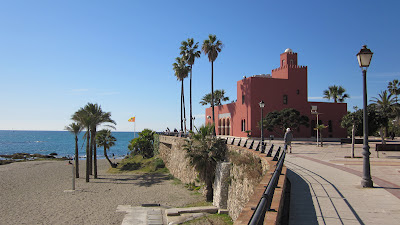This past week the wonderful disability & welfare rights advocate, Sue Marsh, blogged about a great idea she had and which was supported by several well-known economists. See here for more details as it is well worth a read.
The article prompted me to add my two pennies worth:
I've been going to Southern Spain for more than a decade for my health on GP's advice. In a similar vain, I do not understand why Govt./LA's do not send well-ish elderly/disabled to Spain to be cared for during the winter - cheaper than costs in UK, less need for fuel allowance, carers, meals-on-wheels, etc. Also benefit from better climate and social activities - thus less loneliness. I believe Germany & Denmark (???) send some folk there to recuperate.
[Image description: the author shuffling along the esplanade in Benalmádena, Andalusia.]
More than a decade ago, my then G.P. advised me to winter in southern Spain for health reasons. My osteoarthritis (inter alia other conditions) is greatly affected by Manchester’s (north-west England) damp climate to my detriment. This results in my not being able to walk and so needing to use a wheelchair, and, worse from my perspective, being confined to my bed for approximately two in every three days. Being bed-bound unsolicited is no slacker’s dream; but rather a Kafkaesque nightmare of imprisonment within the same four walls and exile from social contact (well, prior to facebook anyhow!). Despite the current Government's media approved scrounger narrative: no-one in their right mind would willingly choose this as a lifestyle. However, once in Spain my condition considerably ameliorates as it does for many OAPs (retirees) who also winter there themselves.
The Conservative-Liberal Democrat coalition is desperate to find ways of saving money. Spain is desperate to create jobs and boost its economy.
I suggest that Britain sends those of its elderly, disabled and ill-health sufferers who are willing and able to Andalusia during the autonomous region’s off-peak tourist season, roughly October to March. The Junta de Andalucía could co-ordinate consortia consisting of hotels, medical establishments & town councils to bid for contracts and/or they could calculate a fair rate to charge the UK Government or individual local authorities.
The advantages to the UK might include:
A reduction in excess winter deaths;
A reduction in the need for winter fuel allowance;
A reduction in CO2 emissions due to reduction in energy use;
A reduction in water use;
A reduction in winter pressure on the NHS;
A reduction in the need for ‘flu jabs;
A reduction in the need for (humane) social care;
A reduction in the need to import foodstuffs;
A reduction in the number of travel journeys made & use of public transport, thus reducing stress on the transport infrastructure;
A reduction in the need for meals-on-wheels;
A reduction in the demands on the charity sector;
A reduction in the workload of social services departments;
A reduction in crime against the person;
A reduction in loneliness for those sent out to Spain;
An increase in health & well-being for those sent out to Spain;
An increase in employment and/or job-security in the airline industry;
An increase in employment and/or job-security in the policing/security industry.
Disadvantages might include:
An increase in property crime;
A reduction in spending locally.
The advantages to Andalusia might include:
An increase in hotel room occupancy rate and thus income of hotels;
An increase in employment and/or job-security in the tourism/hospitality industry;
An increase in spending in the local economy by those sent out to Spain;
An increase in spending in the local economy by those newly employed and/or retained in employment;
An increase in employment and/or job-security in the medical industry;
An increase in demand for locally- or nationally-grown or reared foodstuffs;
An increase in use of public transport and/or taxis, so supporting the transport industry;
An increase in employment and/or job-security in the airline industry;
An increase in employment and/or job-security in the waste management industry;
An increase in teaching jobs to give all those sent out to Spain the opportunity to learn Castilian Spanish;
An increase in Spanish cultural awareness;
An increase in cultural activities for both locals & those sent to Spain;
An increase in employment and/or job-security in the cultural industry;
An increase in the need for policing/security thus an increase in employment and/or job-security for the security industry;
An increase in well-being of locals gaining employment and/or increasing their hours/job-security;
A reduction in the need for benefits for those obtaining jobs and/or those with extended hours.
Disadvantages might include:
An increase in the use of precious water resources;
An increase in CO2 emissions;
An increase in pollution;
An increase in waste;
An increase in pick-pocketing, muggings, etc.
[Image description: the author on a two-stick day in Míjas, Andalusia.]
I understand other countries have similar schemes: but I believe what I am suggesting is on a scale not previously contemplated. Is it worth a go? Or am I being hopelessly naïf and idealistic?


can't you see the daily mail exploding at tax payer funded holidays for the workshy? Living in the sun and drinking at the taxpayers expense?
ReplyDeleteCourse I can: but thankfully my life, thoughts and ideas are not subject to the DM - yet! %)
ReplyDeleteIt seems the Germans are already exporting care of their elderly: http://www.guardian.co.uk/world/2012/dec/26/german-elderly-foreign-care-homes
ReplyDelete